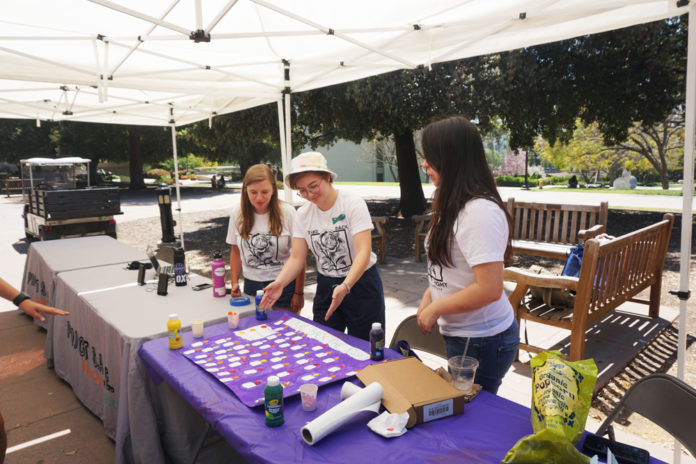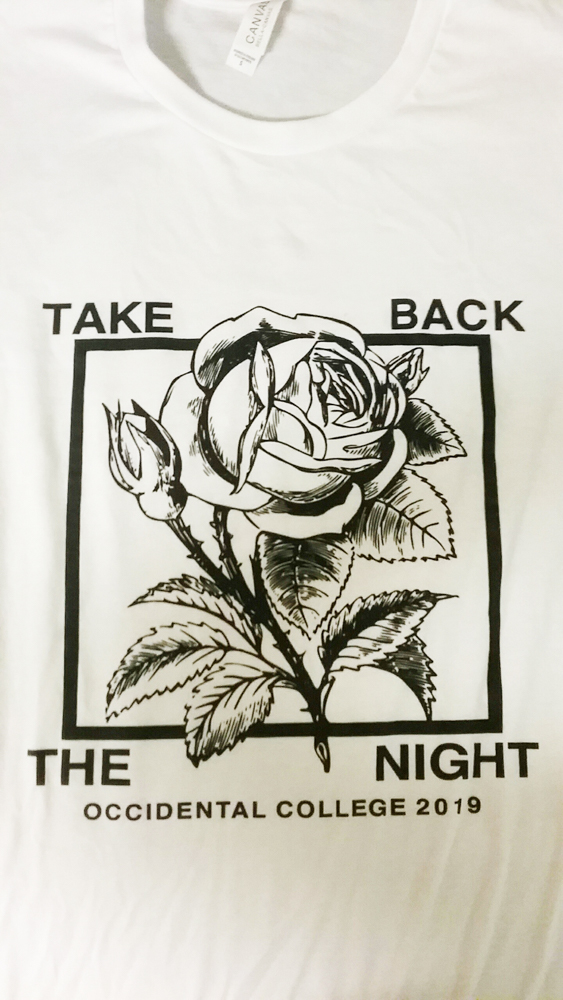
Project SAFE’s Take Back the Week featured numerous events and workshops April 22–25 to raise awareness about sexual assault and provide healing spaces for survivors. The week included a keynote speech given by Leah Lakshmi Piepzna-Samarasinha and Occidental’s Take Back the Night event, an evening dedicated to raising awareness about sexual violence and creating a community of care among survivors and their allies.
According to Survivor Advocate and Senior Manager of Project SAFE Marianne Frapwell, working to prevent sexual assault is particularly important on college campuses since sexual violence highly correlates with the residential college experience. The age group that most college students fit into, 18–24, is the most likely age group to experience sexual or interpersonal violence, according to Frapwell.
“We have an incredible opportunity and responsibility to be sharing information, teaching and practicing how to be in healthy relationships with each other,” Frapwell said. “We know that people on this campus want to be good to each other … If we can provide them the tools and the communication strategies to understand what consent is, to understand how to intervene when they see something concerning, to support their friends when they’ve experienced something painful, then why wouldn’t we?”
Ryan Romero (senior) is one of Project SAFE’s five Program Assistants (PA). These students provide training for the student body throughout the year and are responsible for organizing Project SAFE’s programming, including Take Back the Week.
“From my perspective, the Oxy community has always tried to emphasize and represent a culture of care on campus,” Romero said. “I would personally argue that this week is one of the programs that best captures that value.”
Take Back the Week’s keynote speaker was Piepzna-Samarasinha, a queer disabled femme writer, organizer, performance artist and educator of color. The event was titled “Wild Survivor Dreams: Dreaming a Future Beyond Sexual Assault.”
Caroline Parker (sophomore), a Project SAFE PA, was very excited for Piepzna-Samarasinha to come to campus because a lot of the survivor stories center cisgender white women.
“The reality is that violence intersects with so many different identities. It’s a problem that a lot of activism around sexual assault focuses on white women,” Parker said. “I think that it’s necessary to show the full picture and make sure we’re standing up for everyone.”
Project SAFE PA Junko Anderson (sophomore) said they found Piepzna-Samarasinha’s perspective refreshing.
“As a queer and trans person and as a survivor myself, it’s just so nice to see someone who — even though our identities don’t perfectly line up — is part of a lot of the same communities as me,” Anderson said.
According to Zoe Alles (senior), one of her favorite parts of the talk was when Piepzna-Samarasinha thanked the students who attended the event for coming, while also recognizing that there were probably survivors who wanted to come but could not because they were too triggered or tired.
Piepzna-Samarasinha talked about her own journey as a survivor. On this journey, sheencountered people who view survivorhood as a fixable condition and believe that survivors are either cured or broken, nothing in between. Instead, she sees survivors as complicated, capable and knowledgeable.
“There are still so many places where we are made to apologize for being visibly survivors,” Piepzna-Samarasinha said. “But survivors have skills that non-survivors don’t. We know things, we know rape culture, and we also have all this tenacity and persistence and understanding of trauma and all these tricks to get through it. We’re really good as leaders. Our survivorhood is not something we have to apologize for.”

According to Piepzna-Samarasinha, while it is horrible that so many people have experienced sexual assault, there is power in those numbers and power in telling survivors’ stories. Her first book, “The Revolution Starts At Home: Confronting Intimate Violence in Activist Communities,” collected stories of intimate partner violence within activist communities. According to Piepzna-Samarasinha, sharing these stories connected survivors and allowed them to build off of each other‘s strategies for dealing with violence.
“This work looks really differently than the ways that a lot of folks visualize what survivor activism looks like. We still default to this idea of, ‘It’s being at a rally, it’s being in a march, it’s being in the streets,'” Piepzna-Samarasinha said. “But for us, we’re like, ‘No, actually, it’s the power of storytelling by survivors on our own terms, us using the messy, real stories of our lives as tools.'”
Project SAFE embraced this same idea of storytelling as a form of healing during its “Take Back the Night” event, a survivor speak-out at the Greek Bowl April 24.
“It’s this incredibly powerful space where survivors tell their stories of violence and of overcoming the hardship that they faced, but do so in a way that is really cathartic,” Frapwell said. “It’s a really beautiful night every year, where often survivors have found a really powerful release in sharing their story.”
According to Project SAFE PA Sandy Pattison (senior), the Take Back the Night event is special because of the environment of trust it creates for survivors, who know that anything they say is confidential.
“I think knowing that they are in a community, or at least one specific space, where everyone there 100 percent has their back and 100 percent is there to make space for their story is really essential,” Pattison said.
Parker said that the event is different from the other events throughout the week.
“Whereas a lot of our other events are more educational and about raising awareness, this is a space for survivors, since they don’t typically have the space to share their stories and reclaim their stories,” Parker said.
Petra Jasper (first year) said Take Back the Week takes a sometimes daunting issue like sexual assault and makes awareness of the issue tangible for the entire student body. This is in part accomplished by Project SAFE’s free shirts for students, which Jasper said are both beautiful and symbolic. The white T-shirts feature a black hand-drawn rose with thorns inside of a square surrounded by the text “Take Back the Night.” For Jasper, the rose represents life and beauty, while the thorns represent the respect, agency and power that everyone deserves.

Charlene Chen (junior) created the artwork that appears on the shirts. Chen said the design shares her journey of coming to terms with her own survivorship. She wanted her design to show the tension between ideal romance, often represented by a rose, and actual memories that individuals have of those experiences, which are not always positive.
“The rose just draws your attention immediately,” Pattison said. “It’s beautiful and resilient.”
Jasper said that seeing so many students in Project SAFE’s shirts is impactful and creates an environment of solidarity.
“I think it’s great because we all stand for something together, and we’re a community. Whether you’re an ally or you have been assaulted, we’re together and working towards two common goals — first, awareness and second, making sure sexual assault doesn’t happen anymore,” Jasper said.
![]()



































